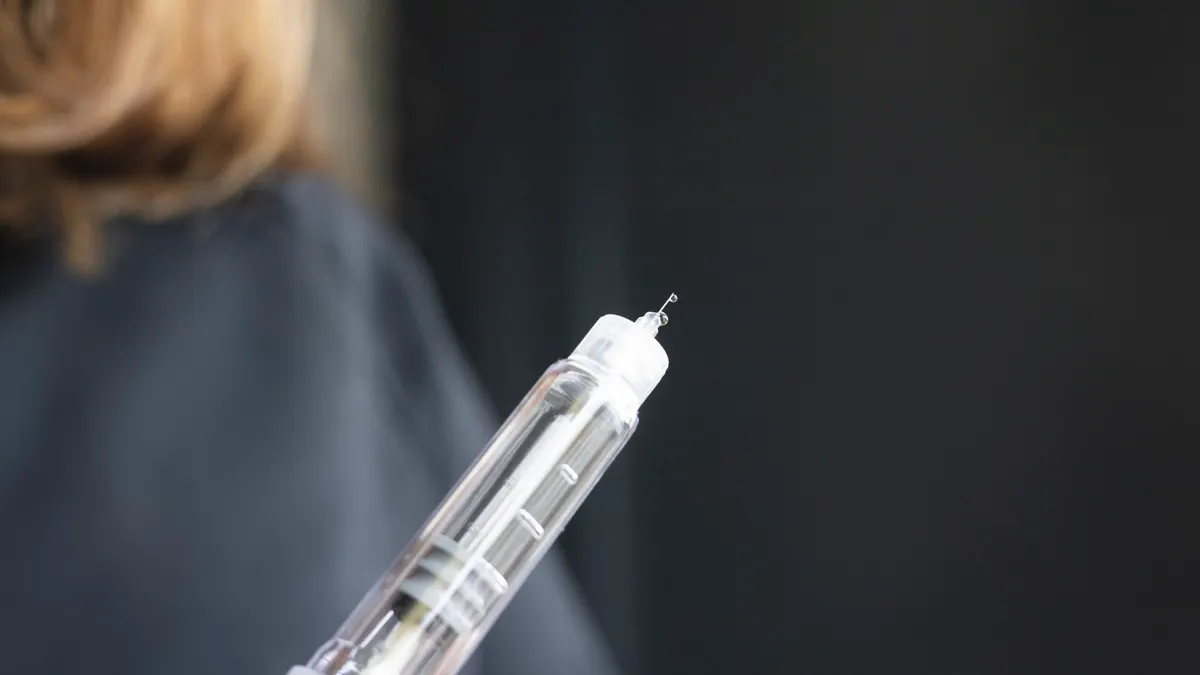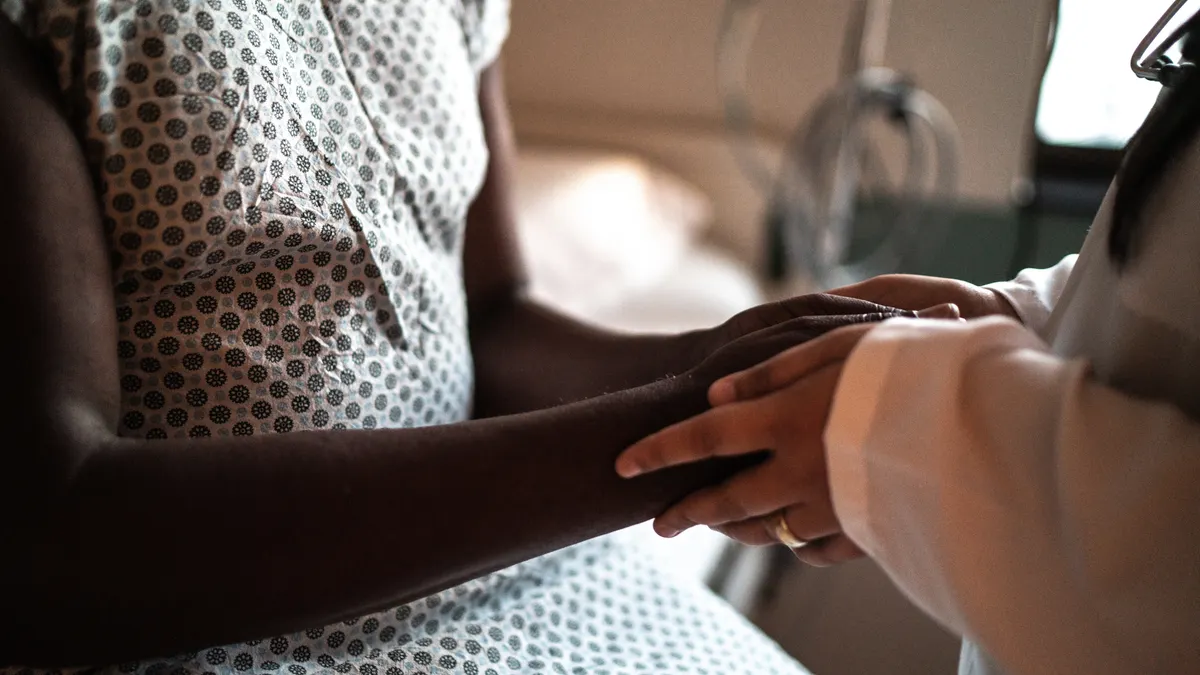When Tamar Thompson’s husband was diagnosed with prostate cancer, she knew better than most what kinds of testing and care he’d need. As vice president and head of corporate affairs at Alexion, AstraZeneca Rare Disease, Thompson is intimately familiar with the healthcare world. And as a decorated officer in the United States Air Force, her husband should have received the best, most cutting-edge care.
Despite all these advantages, Thompson still struggled to get her husband the genetic testing she knew was available.
“I had to fight for that. It wasn't offered right up front,” she said. “I don't know that it would have been (like) for someone who was non-African American. But I know that for him, I had to fight for a number of things. And thank goodness I work in the space to know what to ask for. But I saw the misses along the way.”
Thompson even pulled her husband out of their local health system for fear that he wouldn’t get adequate care as a Black man.
These challenges — including lack of access, missed care and subpar treatment at small or rural hospitals — are common healthcare experiences for people of color.
They’re also common for rare disease patients, and Thompson sees those parallels every day.
For instance, some rare disease patients live in rural communities without access to an academic medical center, she said, and that’s true for minority patients, too.
“Black and brown patients generally can't travel more than a 50-to-75-mile radius from their home,” she said.
"I've never looked back. I'm still loving every minute of it and appreciating the opportunity and the privilege that I get to come in every day and search for disease patients.”

Tamar Thompson
VP, head of corporate affairs, Alexion, AstraZeneca Rare Disease
They often face similar financial hurdles, too.
“Rare disease patients may live on one income, often because one person has had to give up a job to be a caregiver. And that's very similar to some of the challenges you see in the minority communities as well,” she said.
Those parallels are some of the reasons why Thompson was drawn to working with the rare disease patient population at Alexion.
An unconventional path
A rare disease biopharma company that was acquired by AstraZeneca in July 2021, Alexion has five approved medications for seven rare diseases, including the blockbuster first-in-class C5 complement inhibitor Soliris (which was, at one time, the most expensive drug in the U.S.), and the second-generation C5 complement inhibitor Ultomiris. Its pipeline also consists of potential medicines for more than a half dozen rare therapeutic areas, including hematology, neurology, cardiology, nephrology, bone metabolism, metabolics and ophthalmology.
Thompson leads the government affairs and policy and communications functions for the company, working to amplify the voices and experiences of rare disease patients, advocate for needed policy changes, create access opportunities for patients and partner with rare disease organizations.
Prior to joining Alexion in 2019, she worked as the head of federal executive branch strategy and state government affairs for Bristol Myers Squibb. However, her path to healthcare policy was much more unconventional.
At first, Thompson studied nursing, but soon realized that she wasn’t quite suited for it. Sticking a needle in someone’s arm and telling them, “Suck it up, buttercup? That probably isn't the best bedside manner,” she laughed.
Instead, she shifted her focus to healthcare administration and the revenue cycle side of healthcare, eventually pivoting to the life sciences and policy advocacy. But it was working at Bristol Myers Squibb that first exposed her to the rare disease community and opened her eyes to the parallels between the experiences of rare disease patients and the healthcare inequities that minority communities face.
For instance, she notes that it often takes rare disease patients roughly five years to get a diagnosis, and that missed or delayed diagnoses are also common among ethnic minorities. Such diagnostic disparities are well documented in academic research, from dementia, to autism spectrum disorder, to appendicitis, to breast cancer and many other conditions.
Too often, health complaints of people in the Black community — especially Black women — are dismissed, Thompson said. In fact, she had a close family member who died from a disease because they didn’t get a diagnosis until it was too late.
That’s why, when she had the opportunity to move to Alexion and advocate on behalf of the rare disease community, she took it.
“It felt really aligned and parallel with my family journey, with what I've seen in my community, so I was drawn to it,” she said. “I've never looked back. I'm still loving every minute of it and appreciating the opportunity and the privilege that I get to come in every day and search for disease patients.”
Rare disease progress
Now, as the U.S. commemorates the 40th anniversary of the Orphan Drug Act, as well as Rare Disease Day later this month, Thompson is reflecting on how far rare disease treatment has come — and how far it still needs to go.
"If you look across industry at what's in development, 40% of that is rare by some definition. So that’s promising for a community with more than 7,000 unique rare diseases."

Tamar Thompson
VP, head of corporate affairs, Alexion, AstraZeneca Rare Disease
“We can point to more than 500 unique therapies that have come through the pathways under the Orphan Drug Act,” she said. “I think the Orphan Drug Act is really an example of when you get policy right, it can be a motivator and a simulator for innovation, and it's good for patients at large.”
However, she expressed concern that certain provisions within the new Inflation Reduction Act (IRA) could inhibit future progress in rare disease research.
Although the National Organization for Rare Disorders called the IRA “a significant step forward in helping ensure that individuals and families with rare diseases have access to the comprehensive health care they need to survive and thrive,” Thompson said provisions within it undermine part of the Orphan Drug Act.
Part of the IRA allows the CMS to negotiate the prices of certain Medicare and Medicaid covered pharmaceuticals and biologics. However, orphan drugs that are indicated for “only one rare disease or condition,” are exempt from price setting, which could discourage companies from studying products for secondary or tertiary conditions.
“We have drugs that are useful for multiple disease states: One therapy, but useful for multiple rare diseases. We wouldn’t fall under the exemption for that under IRA,” Thompson said.
Still, she remains hopeful about the future of rare disease treatments and health equity for all patients.
“If you look across industry at what's in development, 40% of that is rare by some definition. So that’s promising for a community with more than 7,000 unique rare diseases and roughly 5% (that have) approved treatment options,” she said. “If you're telling me that 40% of the pipeline in development is touching that, that is a call for excitement and enthusiasm within itself. That means hope and promise.”



















